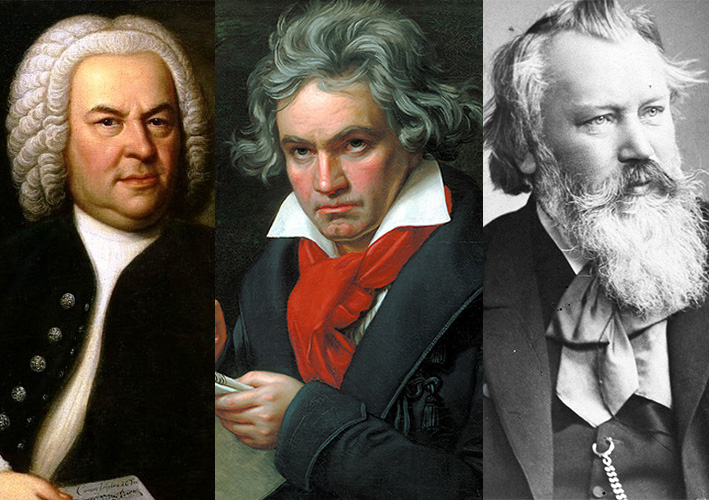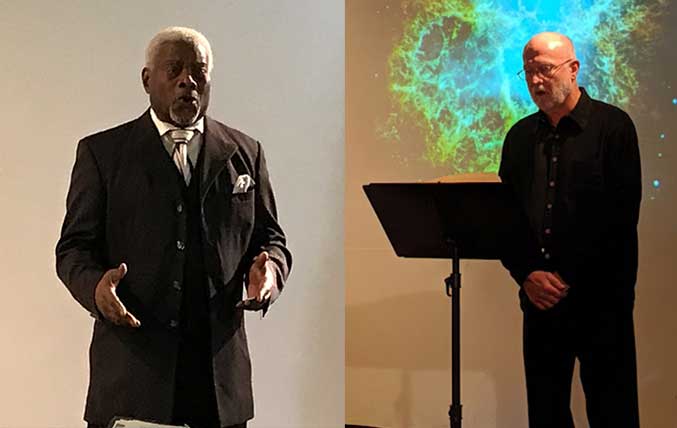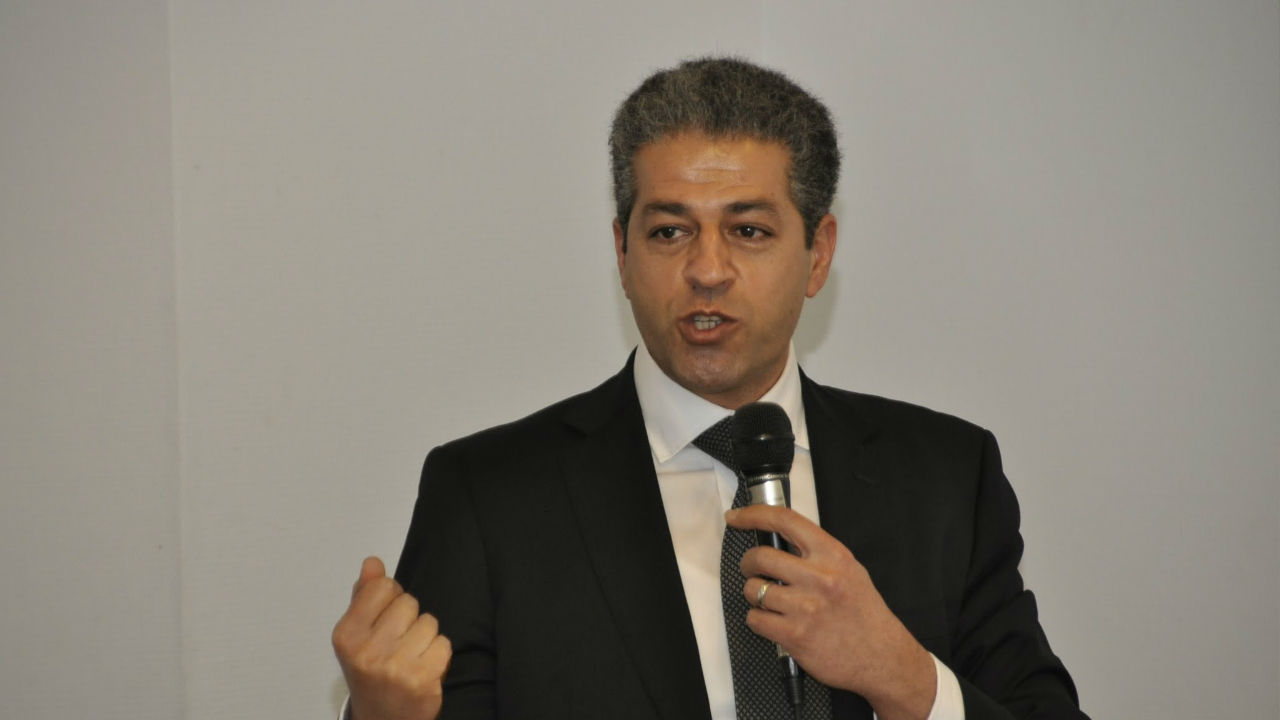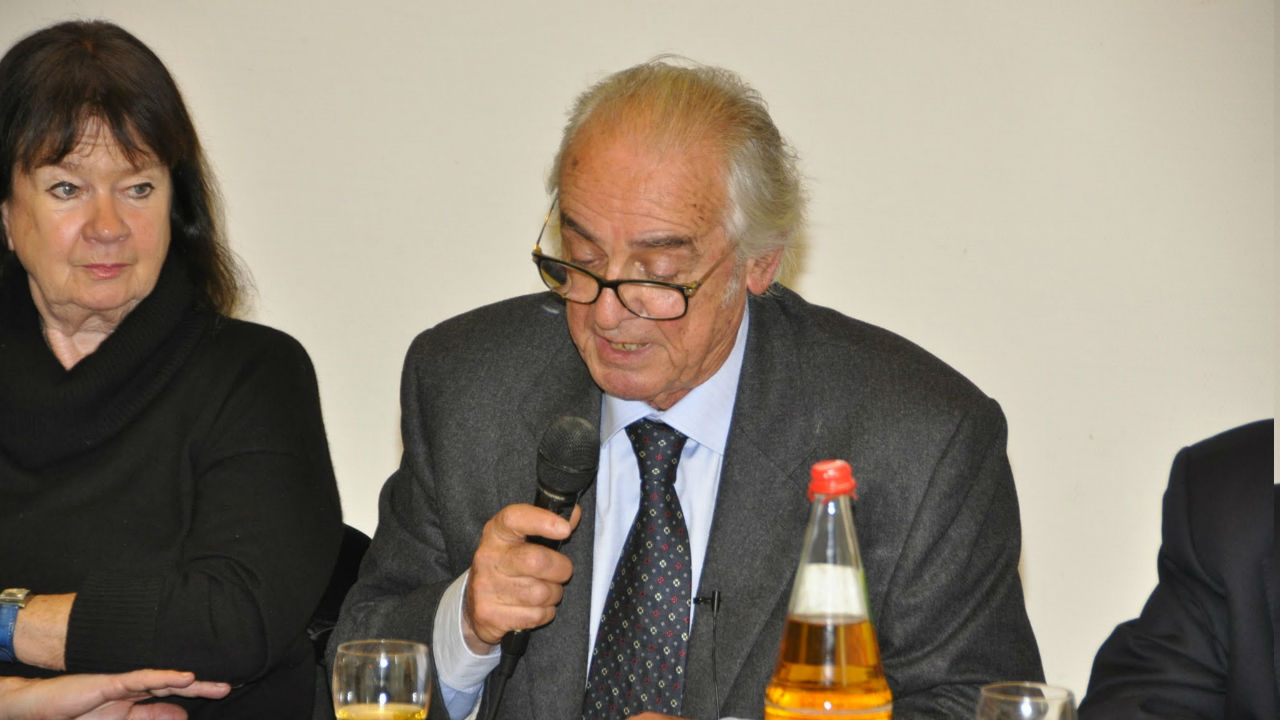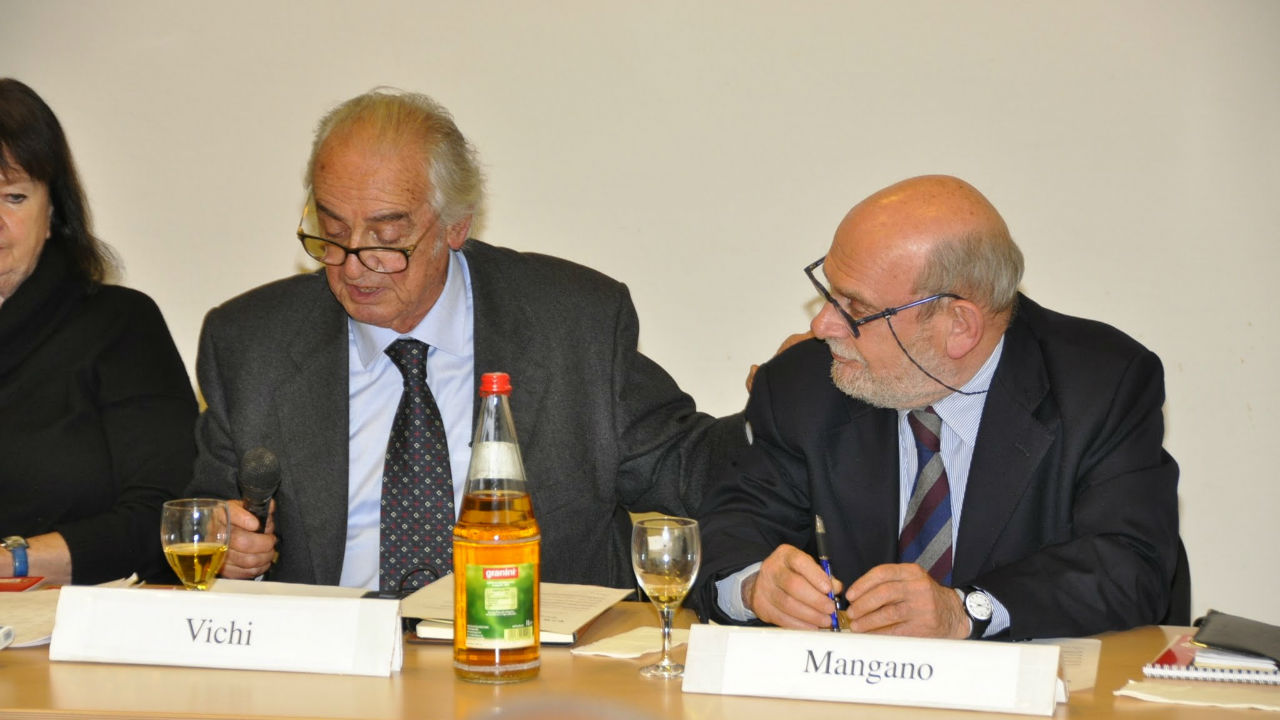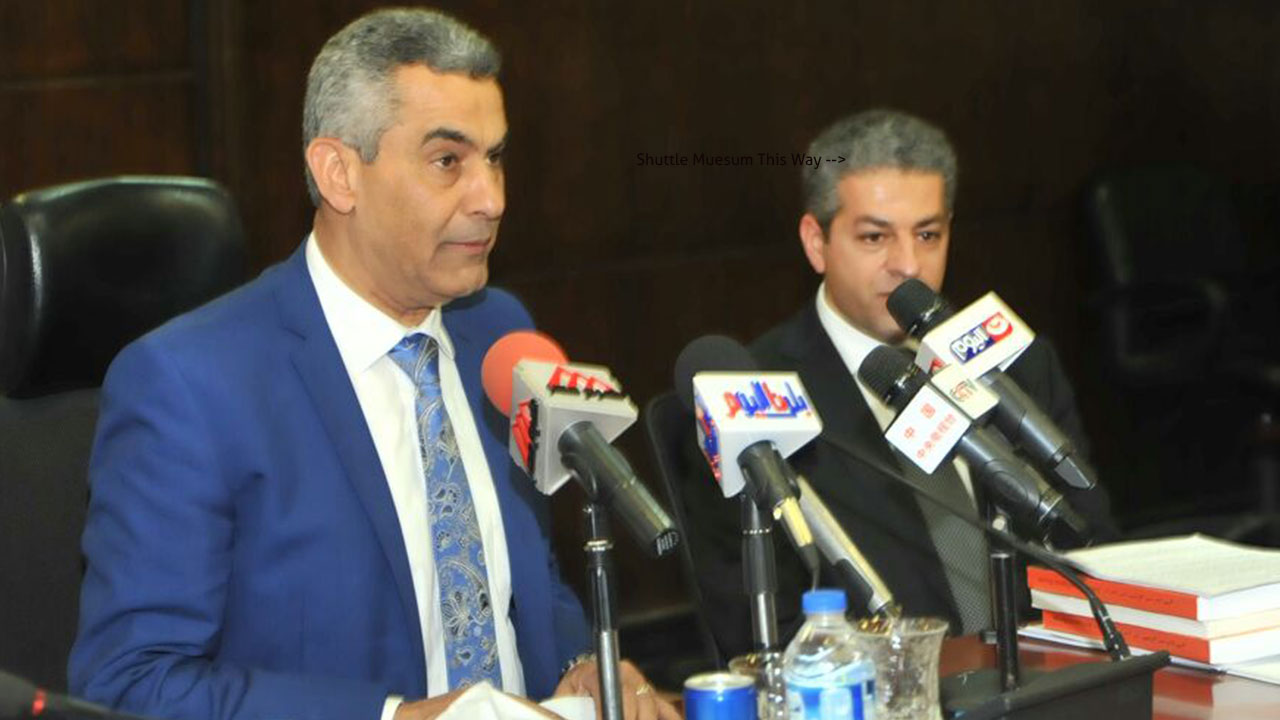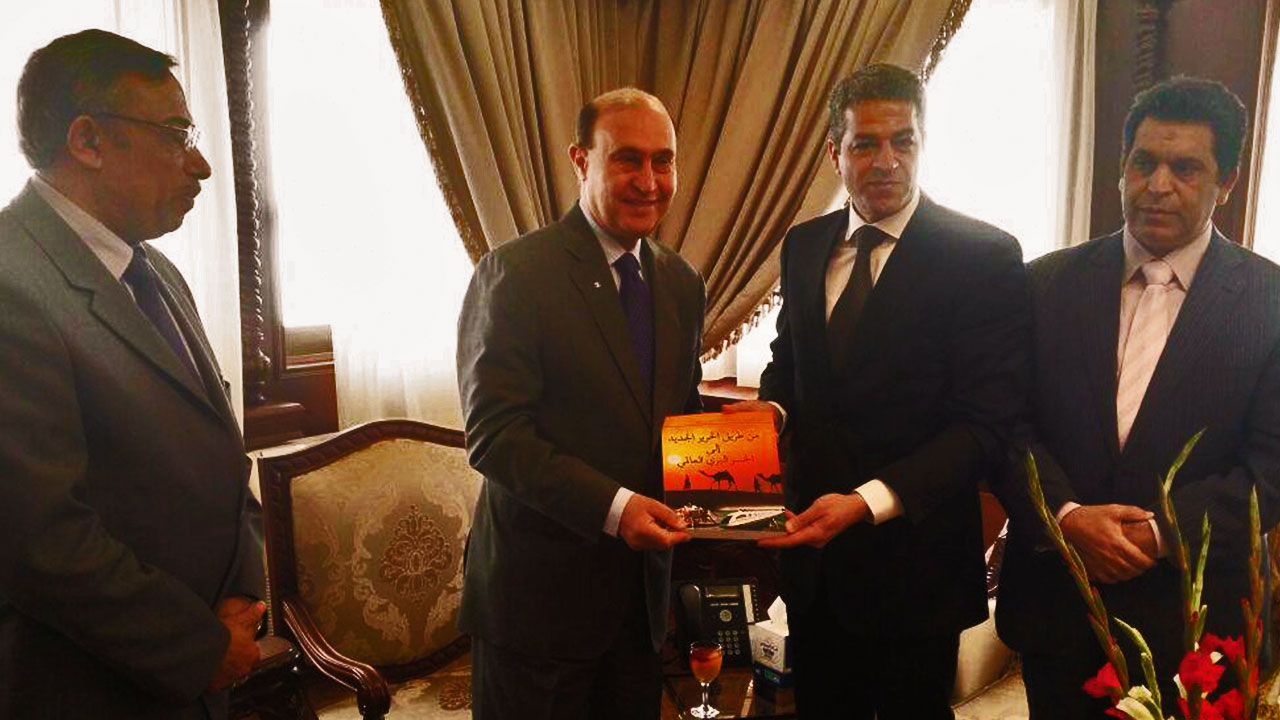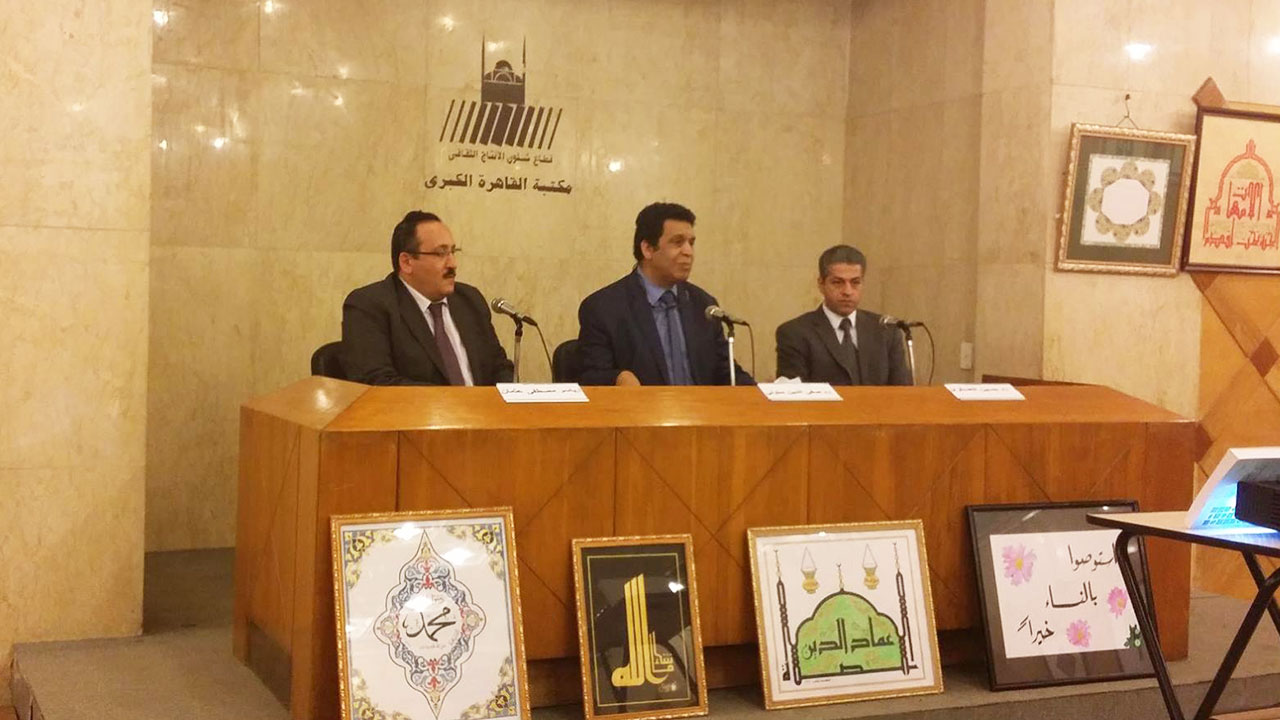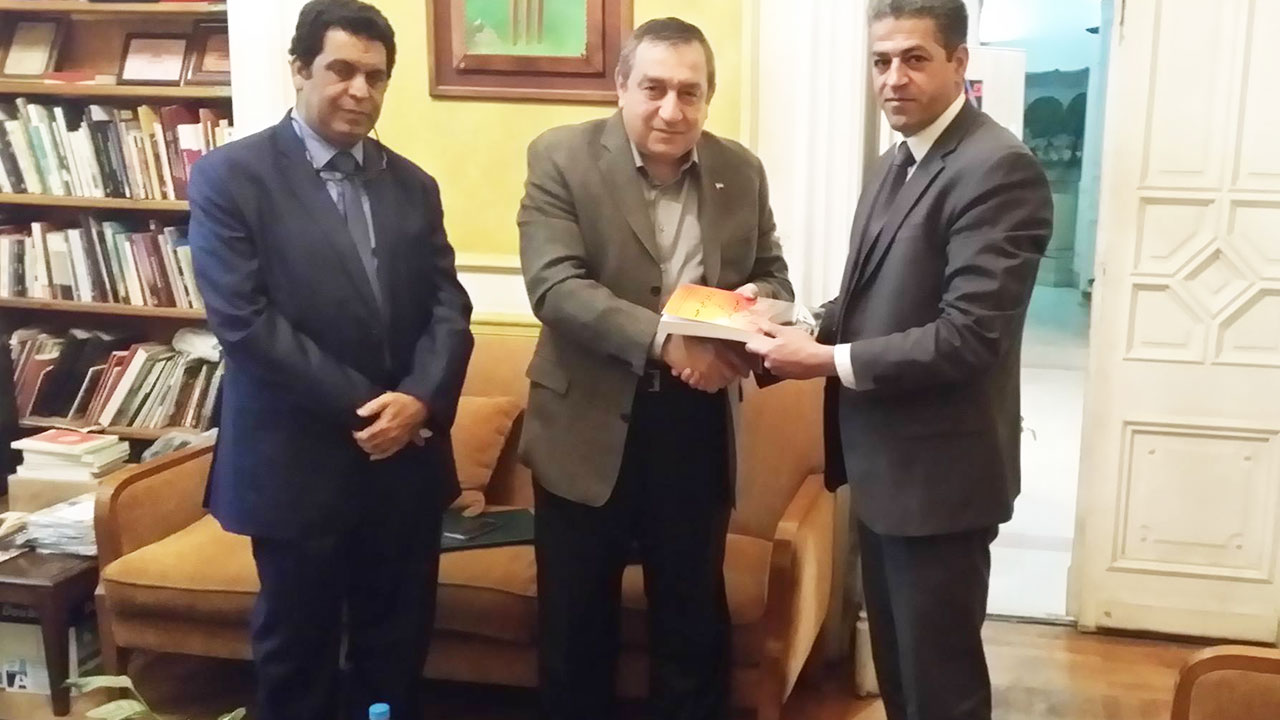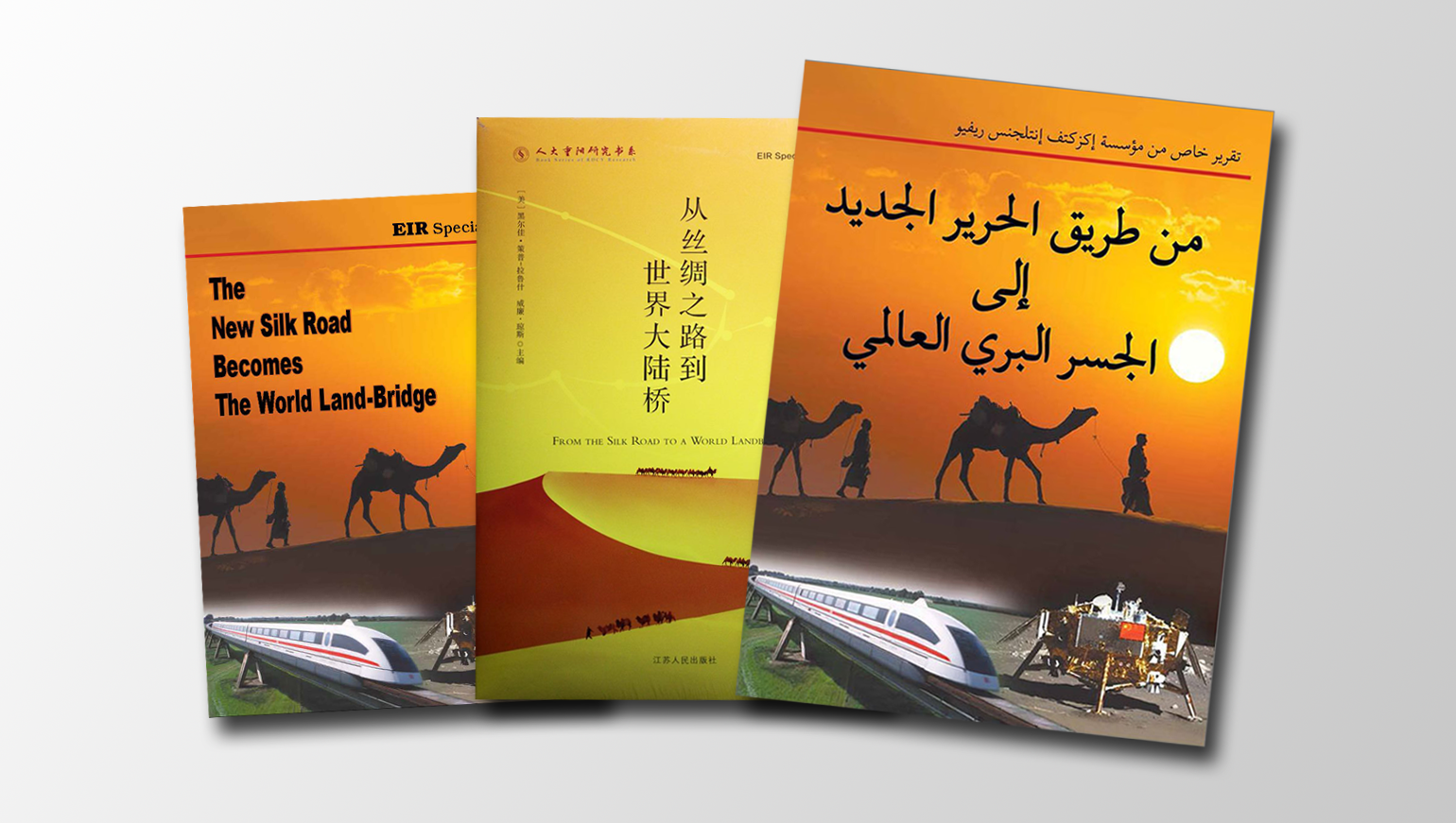DENNIS SPEED: So, the first thing I’d like to do, is go to Lyn, since we haven’t heard him live; and he’s been listening the entire time. So, do we have an audio on Lyn? OK, we’re trying to bring you up here.
LYNDON LAROUCHE: Aah, I am now speaking.
SPEED: OK, very good. So, you just want us to go right to questions, Lyn? Or do you have anything you’d like to say at this point?
LAROUCHE: No, just let the questions out; I think that’s the best way to do it. I’ve been listening to things all the way through; now I want to hear some from you.
SPEED: OK, so anybody who has questions, there are two microphones here in the center. Just come down; and let’s just take the first question.
Q: I have a question for Dr. Hsu. Dr. Hsu, I understand terrestrial photovoltaic is actually, if you calculate all the energy required to manufacture panels, that it’s actually a net energy loss; that it takes more energy to manufacture the panels than you ever recover from the solar energy captured and converted to electricity in a terrestrial photovoltaic. Are the efficiencies of space-based solar better than that? And can you also talk to, to the extent you have knowledge of the terrestrial photovoltaic, is there optimism about the levels of conversion, or the efficiencies of conversion such that we might at some point have a net energy payback? Or will it continue to be the case that the more solar we get, the more old solar — fossil fuels and things — we have to burn to get that, and that’s actually a negative result?
DR. HSU: To answer your first question about terrestrial solar, there’s a lot of study, to answer your question, the reality is the efficiency of the solar cell has continued to improve. And 5-10 years ago, you can hardly see 15%; I talk about the solar cell efficiency. And right now, you can easily see over 19%, even 20% poly-crystalline based solar cells. There’s also new type of material we call the synfilm; and there’s a different type of technology. And those are not energy intensive to produce. There’s First Solar, a U.S. company, and they produce the synfilm solar cells right now. Based on their claim, their study exceeded 20-21; it’s approaching the 25% range. So, as production process techniques improve, you’re going to see continued improvement on the efficiency. So, the higher the efficiency, the better you return. And also, sometimes people don’t realize the poly-crystalline solar cells, mono-crystalline solar cells, are made of dirt basically; silicon sand. So, we understand 40% of Earth’s composition is this silicon sand, so they can really be made dirt cheap. So, as technology improves, that question will be obvious to be answered. There’s a lot of study. One report came out of the NRL — the National Renewable Laboratory — in Colorado; and it has some dedicated study on the payback of terrestrial solar.
As regarding your question on space solar; the study based on the late 1970 NASA/DOE, it’s contracted to Boeing study. The report at that time, the solar component, solar elements is based on, of course, the old poly-silicon technology. But right now, I was in close communication with the Swiss Institute of Technology; a professor in his laboratory has achieved more than 23% efficiency on synfilm. Those are not very hard to produce, and also are radiation-proof and can be utilized in a space environment. I recommend there’s a study group called the Solar High Study Group; it’s a group of people like myself and NASA retired engineers and some of the people who were project managers in the Apollo era back in the 1960s. It’s a volunteer group; they probably should report answering like safety, conversion efficiency, payback, and cost of space solar. So, a lot of countries already have programs for doing that; like the governments of Japan and China, and also NASA has some small programs they’re working on, on the transmission, we call WPT technology — wireless power transmission. So, it’s called solarhigh.org; and if you google the material, you can see. Originally, I was going to give a much detailed, technical presentation; but on the flight from Houston I changed my mind. I said probably for this audience, maybe I should talk first and most; a lot of people haven’t heard about the space solar concept. So, I have another presentation I did not really select to present it here.
SPEED: Let me just say the following: What I want to do is, I want to take some questions for Mr. LaRouche, because as I said, we’ve heard from people here. Let’s do that first, and then other questions that follow. So, does anyone have a question directly for Lyn?
Q: Good afternoon, Mr. LaRouche. My name is R— K—; I’m from Old Towne, Maine. And I’ve been following you for decades; and I’m glad you’re still here with us. God bless you. I’m 65 years old, but when I was going to school in 1971 in Wichita State University, a lot of things were happening in education. And that was the beginning of where we started studying the future. Our textbook in that class about future change was about the dynamics of change. And keep in mind that 20-year olds in that class were told that in 20 years’ time, we were going to have 4-day work weeks; gerontology work as a job creator; leisure activities — people should major in those, so that when people get older … Pollution problems were going to be solved; everything was going to be great. Twenty years later, I’m in a class at Bangor at the University of Maine, and I heard the same thing. Well, now I’m 40 years older, and I’m not 20 years old anymore and naïve; and I’ve had a little experience. Greed and corruption stops it every time. And when we’re talking about talking about greed and corruption with all of this — space and whatever — it comes down to the petrodollar Ponzi scheme scam that has been foisted on this world. And everybody who takes part in that, people think oil is just fuel; it’s textiles, it’s pesticides, herbicides, it’s pharmaceuticals, it’s everything. Everybody who’s making money off of that system wants it to continue; especially the ones at the top. All this fighting that’s going on, the gas lines that wanted to go across Syria; blow Syria up. The Libya, the gold dinar —
SPEED: Excuse me, could you ask a question?
Q: cont’d: They wanted to have a real, solid currency. Murder him. If you don’t want to trade with the petrodollar, murder Saddam. It just goes on and on. We have to —
SPEED: Excuse me, could ask a question?
Q: cont’d: — attack the corruption of the Federal Reserve petrodollar Ponzi scheme scam.
SPEED: Excuse me.
Q: cont’d: The central banks are private banks; people don’t realize that, and we don’t talk about it.
SPEED: Sir, you’re simply speaking. Would you ask him a question? [Q2 continues on, but mike is cut off.] Let me simply make a — hold on; let me just say something here. Hold on. Let me simply say something here. We’ll have to shut the microphone down if you continue.
Let me say something to the audience, please. This is a very serious gathering. It’s not a circus. If you have a question, please ask it; and ask it respectfully and be short, and hopefully have a thought when you get up to the microphone. Then, allow the speakers to respond. OK, so Lyn?
LAROUCHE: Yes, first of all, on this whole problem that was presented; what he was presenting in the course of his blast. First of all, these considerations are really irrelevant; that is, the types of considerations that he has defined are absolutely irrelevant. But it’s based on an assumption which is a false assumption about the nature of mankind. Now actually, mankind is a unique specimen; unlike any other known living creature. Because only the human mind can create a new system of the physical system; and the physical system is to be determined by the action of the mental system. That’s the way science actually works. There are other interpretations, but they are mistaken. It is the human mind, and the human mind alone, that is capable of generating a new physical state in the practice of the Solar System or any other such system. Therefore, the idea of trying to make deductions from phenomena is a mistake. There are relationships of phenomena to these kinds of things, but they are understood only in terms of their being an effect; not as being a cause.
Q: Hi, Lyn; this is D— from Montreal. I’ve been a full-time member for five years. I just wanted to, based on what the organization has accomplished in terms of bringing people together in different parts of the world, bringing governments together; there was mention of the LaRouche Youth Movement, which to my knowledge was started in the year 2000 or something. And we’ve obviously observed that we’re not getting younger, and the LaRouche Youth Movement is gotten older; but there’s always a new generation. There’s always a new set of younger people. The idea of who will be the next LaRouche Youth Movement generation, or whatever metamorphosis that takes; if you could say something about that. And I just hearken back to what I know to be the history of when you started giving classes at Columbia University; where you were going to the school and actually addressing the students. But with the idea — and I would give credit to the person if I remembered who it was — the idea that although we’re organizing people and we’re organizing them; it’s as important to see the people we’re organizing as organizers. And rather than us organizing them, we’re a tool, we’re a resource that they can come to, to help them organize in the schools, etc. So, if you could say something on that.
LAROUCHE: It’s wrong; there are aspects to that thing that are relevant. But the principle that you present is wrong. The character is, the humanity of mankind, is that the human individual, who has a voluntary creative power, in order to understand processes, is the individual, who actually efficientlydefines the destiny of the human species; not just in one person, but in terms, of the way of the practice of mankind among persons. The usual interpretation of cause and effect in human behavior is wrong; it is the human mind’s creative powers, and the human mind has a very specific kind of creative powers. And the creative powers of mankind are the source of the discovery of the principles of discovery, in themselves.
Otherwise, no; it doesn’t work. You get all kinds of recipes, all kinds of stories; but none of them really work when you go down and test the matter in detail.
Q: I’d just like to kind of bring up the subject of global warming and climate change. Just in this sense: I wonder if you, Mr. LaRouche, would agree that fossil fuels are comparatively — compared to where we are now — a very primitive form of energy generation. And that as the population of the Earth increases, it’s hardly better than burning wood; we will simply not be able to sustain an advancing scientific civilization based on burning fossil fuels. I think maybe you might agree with that, and that instead we have to look at the energy flux density; and say that we have to move on to something more advanced, such as nuclear fission, fusion, etc. And how about something like this? Pollution really is a big problem. Over there, they’re using coal fuels over in Beijing, and the smog is so horrible people can hardly live. So, we do need to move on to something more advanced.
SPEED: OK, so your question is about fossil fuels?
Q: cont’d: Yes, but my other question is, can we avoid conflating that with this bizarre theory of global warming? In other words, even if global warming is false — which I believe it is — nevertheless, don’t we need to progress to higher forms of energy generation?
LAROUCHE: No, that’s not the way it works. Take the case of human behavior first of all; and that simplifies what the issues are possibly. First of all, all creativity of mankind is generated from the primary source of the creative powers of the human individual; not from some external source. See, that’s what the difference is; what we call creativity in human behavior is the basis for the idea of what the principle of the human mind is. The human mind is driven by a noetic power; that is, a creative power which is independent of the individual per se. But which some individuals are capable of discovering and using to develop new things.
For example, Einstein. Now, Einstein is the only man who has succeeded so far in the past 100 years, in really understanding what is the basis of human behavior. Einstein was unique in this respect; and in fact, in the recent 100 years, it has become obvious that he was right and the others were wrong. You see, the way society is organized, mankind is organized by mankind’s own actions; it is mankind’s generated actions that create the failures or successes of human behavior. It is not something which you accept and experience by something that flew by you. Very few people understand this; most people are wrong. They don’t understand how the human mind works. The human mind is a creative process which is unique; and it is the human mind’s insight to principles, the discoveries of principles by the human mind, which creates the progress of mankind.
SPEED: Very good. That’s what I like to see; a man who’s been completely confused by the right answer. [laughter] We have another question over here.
Q: Mr. LaRouche, I come from Queens. My question is, what is the future of magnetic energy?
SPEED: Negative energy?
Q: Magnetic energy.
LAROUCHE: This is not the way to look at it. Everything that mankind does, accomplishes, everything that mankind as a species does, which no animal does. See, no animal can replicate the role of the human mind; no animal can do that if the animal is functional. And in fact, all of the greatest creative forces in the history of mankind are governed by those principles. But the idea that you’re getting a practical approach to solutions is a mistake. For example, the other kind works; it bounces. You have people who are intrinsically themselves creative people; they discover principles. They discover the experience of a principle, which may be their own achievement. If they’re teased adequately, they will become more excited about what they have discovered; they will then turn around and try to lead an audience to recognize what they have discovered as a creative principle. Now it’s the people who think creatively, successfully, who actually make everything good about the human species; the others tend to be not so good.
Q: Hi, Lyn. This is Ian Brinkley here, from Boston. I was just thinking about how you’ve been responding to some of the questions here this afternoon, and it made me think of a particular problem which everybody who tries to engage in effective political organizing runs into. Which is a certain kind of fear and anxiety which blocks the intention to convey a truthful idea when you see that you’re encountering an individual or a group of people who don’t understand something which they really need to understand.
LAROUCHE: Yeah, most people have that problem; most people do have that problem. And when you want to find out where the solution comes to, you have to look at the one case which is the most brilliant case of all: Einstein. Every physicist except Einstein was wrong on the crucial issues. And only recently have people begun to admit that Einstein was right on the question of gravity. So therefore, what you’re talking about is a principle of gravity; and it’s a principle of gravity whose characteristic is that it’s peculiar to mankind. Einstein made discoveries which changed the course of the human species and change the course of history. His mind did it. It is the human mind, which when it is capable, which generates all of the great achievements of humanity. And it’s often a minority of the human species which has the power to do that.
Q7: Hello, Lyndon; this is A— from Montreal. We all know that there’s a strong anti-growth movement; and they’re scared that if we use up all our material, we will gradually die. And we know — Jason Ross gave us a great presentation on how our creativity can actually create new resources; like before nuclear power, it was not readily available. We discovered that. But this anti-growth movement will tell us, “Well, maybe our creativity will fail at one point. Is there a limit to our creativity? Is there one point where we will not be able to discover new things to replace our new technologies?” To that, I usually answer, “Well, I prefer to believe that we will continue to discover; and I prefer not abandoning.” But I wanted to know what would you say? Do you have a better answer to that?
LAROUCHE: I would say the point is, the truth of the matter is collectively, individually, all useful developments — expressions of the human mind — are peculiar to the human mind. Anything that’s valid, belongs to that category of human mind. Now what happens, this is not a perfect process; because you have a lot of people who make a lot of mistakes. So therefore, the answer is, the effective result, the competent resultof the human mind’s work is to inspire a creativity which can be generated only by the human individual mind.
SPEED: Let me just take a moment and ask if there’s anyone from the panel, who has anything that they want to add or say.
JASON ROSS: I can say something; I hope you can hear me OK. One specific thing on — I’m at a real press conference, now. So, ladies and gentlemen, to answer the one thing about whether we’re going finish discovering things or not; I think that this goes to a theme that Mr. LaRouche has been bringing up a lot recently over the past couple of years. Which is the approach of Bertrand Russell, and the 1900 shift in science; where, away from discovering totally new things, the practice of science increasingly became — at least officially — put in terms of “Can you derive your new thought in terms of what we already know?” Where, what Russell tried to do in mathematics, to turn mathematics into logic, got also applied then to science in general. And the opportunity to say, “Hey, we just don’t know everything yet; there is more to know,” got put aside. Bertrand Russell had said in the 1890s, implicitly, that space couldn’t possibly be curved; and that properties of matter couldn’t be any different when you get into the very small. So, in the 1890s, he said that the big discoveries of the 1900s would never happen; he said that there couldn’t be a quantum, and that there couldn’t be relativity.
So, in terms of the example of Einstein as having made a major discovery that overthrew what existed before; that didn’t add to it, but overthrew what had currently existed. I think what he did as a personality was very important for thinking through what should science be?
KESHA ROGERS: I think what is important to think about in this discussion that we’re having right now is, that we’re not dealing with a practical political debate. It’s not about up and down votes, and opinions and whether or not you agree or disagree on a political view. But you have to understand that this conference and this panel in particular, is so important, there’s very dividing issues on this panel, because Mr. LaRouche had something much more fundamental, on the question of, this is a human debate! And I just think about the fact that you take Krafft Ehricke, and I mentioned him earlier, had a very profound concept of this idea of closed world system, versus an open world system. And right now we’re still debating and living in a closed world system, that cannot achieve the type of creative goals and breakthroughs, and which is necessary for mankind to foster its true creative potential. That’s what you have to get at. So if you don’t think your questions are being answered, it’s because you are still stuck in that closed system, and you have to get out of it! [applause]
And so, when I called for a space — and I hope to accomplish this — an international space panel, I wanted to take up this very fight, this very question that doesn’t exist in our political arena right now! And I ask the scientists, where are the politicians? They are not responding to real science; that’s why I’m up here. That’s why Mr. LaRouche and I are collaborating and working on this fight.
And so, just the last thing I want to say, is, Mr. LaRouche is bringing up the genius of Einstein, and he more recently talked about the creative genius of Brunelleschi, and I’d like for him to expound on that a little bit more. Because when we’re talking about the process of creating these new cities, beautiful cities, creating a commitment to space, I think that’s the example we have to use. And the point being, is, Mr. LaRouche is talking about fostering a conception which most people don’t think of, most people don’t think of themselves as having, which is, genius, being genius, creating genius, having your children become genius. You can’t do that in this society! It doesn’t foster it. And we have to do that here, today. [applause]
TOM WYSMULLER: I could piggyback on something Jason talked about. He talked about Bertrand Russell saying that basically most of the science is behind us. When Einstein applied for a job at the patent office, and he worked as a patent clerk for a while, his boss told him, “there’s no future here, because everything that’s going to be invented already has.” [laughter] So — that’s the truth.
Now, these days, you’re hearing a lot of stuff on the climate, and I want to address one of the questioners, that “the science is settled”! Well, guess what? It’s not settled! We’re getting new data every day about climate! We’re learning things, we’re learning relationships that we didn’t know. And you need tolook at the data. And that’s one of the things that NASA’s been pretty helpful in, is provided the data. It’s the people who areinterpreting it, and saying that there’s no questions left to ask, that are on the wrong side of that issue.
So, keep your minds open, keep your target toward Mars, and I do want to apologize: because I was trying to cut my presentation short, I didn’t tell you how to avoid the parking ticket. [laughter] But! What I have in the back window of my car is a sticker and it says, “Get Your Ass to Mars!” [laughter] I was overtime in a parking zone in New York City, they have alternate side of the street parking; and the policeman’s walking up behind the car, looks at the sticker; he’s about to write me a ticket. But then he engages in a conversation about it, and he finds out why I had the sticker there. And he didn’t give me a ticket.
Q: Hi, my name is A—. I feel very honored to be here. I’m from Brooklyn. Something that I do want to say that’s always stuck very close to me, was, an instructor once said to me, while studying Buddhism, “to a beginner, there are many possibilities, but to an expert there are few.”
Now I’m a beginner, and I’d like to keep a beginner’s mind. I know nothing; I come open, but something I did come to understand from NASA’s data, is that there is space junk. For the past 60 years, we have been throwing manmade junk into space. Is there a way to pick up where we left off and make use and harness this space junk?
LAROUCHE: Science. Actual, efficient science! And you may not be able to get a perfect correction of what the scientific principle is, but you can get closer and closer to it by experiencing your own errors, in judgment.
But the point is, nonetheless, that it is the human individual mind which is the only competent authority for solving these problems. Now, some people are not as efficient in making these discoveries or development, but nonetheless, the human being is not an animal. And the usual interpretation of human behavior, is based on the presumption, that mankind is an animal. And that’s when the mistakes are made.
Q: I completely agree by the way, with Lyndon LaRouche about the human mind. But for the same reason, I don’t understand why such names is Tesla, for example, who is at least, maybe in my eyes the same level as Einstein; the great inventor of free energy. Nobody spoke about, by the way, nobody spoke about numerous free energies, carry energy; we never hear about it. The latest has to do with cold fusion and [inaudible 37.47] — you know, my memory’s not very good about it. It’s a major breakthrough, but nobody mentioned it. And I don’t know why, because, although it’s not very widely publicized, but it’s accessible. I mean the majority of these guys — same destiny: two or three people appeared in the whole — [crosstalk] against the United States of America, and they can be put in prison unless they turn over the discoveries. [inaudible] turned over, and then they were closely watched and maybe something could happen to them.
SPEED: Excuse I think we’re going to have to have your question repeated so we can all understand it.
DIANE SARE: You’re asking about the cold fusion?
Q: [follow-up] Cold fusion is not basically it, but that was not mentioned either. But there are so many new and newer inventions which were mentioned by LaRouche, and you know, people may believe that that’s all that’s available, that was presented
SARE: I think he’s asking about many inventions that have been discovered but have not been made available because there’s a kind of Gestapo that prevents this from being allowed to be known.
Is that the idea? Yeah.
Q: [follow-up] And among them is Tesla’s inventions…
LAROUCHE: I don’t think in a functional way, this is not a proper question. But however, there are cases where the individual who’s trying to follow something, may not be able to make the efficient connection between the two facts of relationship.
But all creativity, of mankind, that is of mankind as a social process, is based on a principle which is unique to the human individual mind. Now some people don’t have an adequate development, of the human mind, but if they’re educated properly they can. The case of Einstein is clear. Einstein is, as you know, an entire century has passed; Einstein has proven that his way of thinking, on the basis of his way of thinking, — not on the basis of some design, but on the basis of his way of thinking, made a discovery, which has proven and upset everybody.
So the point is, you have to understand that the source of creative powers of the human individual, lies within the human individual not within that nature.
SPEED: Let me say before we go to the next question; someone on the dais here, pointed out that questions begin with words like, “who, what, why” [laughter], “which?” You know, the problem of the age of Donald Trump has apparently visited the United States with a vengeance! So, please: Use the interrogative when you come to the microphone! Thank you.
Q: Mr. LaRouche, my name is K— S—, I’m from Baltimore, Maryland. I was really overwhelmed by [Egyptian Consul who spoke in the morning panel] Mr. Farouk, and, Egypt, and the way they handled getting into the Land-Bridge thing. Why can’t we do that as Americans? Start our own fund, instead of waiting for the United States to turn around and say, “let’s get on board?” Why can’t we do this like Egypt did [in financing the New Suez Canal] and tell the United States or our government to back out and let us just take it on ourselves?
LAROUCHE: Well, you know the problem is, most of the members of the establishment in the United States today, are crooks. And they have strong opinions! And they believe in those opinions, or they pretend to believe in those opinions. And they do it, and they’re scattered all over the place.
So you’ll need something a little bit better than that. And you’ve got to understand one thing: The question is, is the mind of a scientist — specifically a scientist — is the mind of a scientist, or an especially good scientist, is his opinion or her opinion, is it or is it not, the source of the discovery of a principle which is otherwise not discovered? That’s the issue.
Now, some people are better at that business and others are less good at that principle, but that’s the principle. The entirety of mankind’s success, as mankind, depends upon the creative powers, specific to some specific, individual human beings, — or else they’re wrong! That’s your alternative.
The medicine that is presented, is it correct or is it not? And all the important things in science, all the important things in human individual knowledge, depend upon the validity of these kinds of discoveries. Without that, maybe we’ll get accidentally lucky or something, that does happen; but the question is, when it comes to an actual principle, the creative principle, an efficiently creative principle, is actually generateduniquely by the mind of a human individual. Now that individual may make mistakes; but the question of that individual’s ability, to make a discovery of that type, is what’s crucial. And some people are good at it; some of them are not perfect at it. But the whole basis of the human process of human progress, depends upon that principle. Otherwise, you’ve got nothing but animals!
SPEED: We have 15 minutes left for questions, so please be questionable. Try to state very clearly what is on your alleged mind. [laughter]
Q: I’m very questionable. This is more of a social scientific question, I guess. We have many enemies to genius, and you’ve come up against your share in your lifetime, so I guess this is more of a social science question in terms of, do you have any insight, or principle we might use to overcome this fear-based life that we were brought up in? I mean, where we’ve seen genius thwarted time again. So we’re here to bring something home where we can begin to instigate change. Any insights on that?
LAROUCHE: The only insight is, that the educational system of the United States is lousy. It could be improved!
Q: Hi, Mr. LaRouche, I’m A— S— from Baltimore, Maryland. I totally agree with your creative moment and the individual. What is your position on synchronization of individual creative effort [crosstalk] in terms of a mastermind community?
LAROUCHE: Oh, the problem is what happens is often we’ll find, we don’t know which end starts first sometimes. You sometimes get a child who turns out to be a genius, and that’s a discovery. And then you find somebody who is supposedly a leading scientist who’s a bum! So therefore, you have to understand that there are categories that you have to learn to be familiar with, in order to discern which person is probably likely right, or at least right to have an opinion.
And that, the important thing, it’s very important for all mankind, to have access to human minds which are able to deliver maybe not just from the start, but from somewhere in the process; who are able to actually understand something which is tantamount to an original human principled discovery. That’s what the whole thing is based upon. That’s what every scientist does who’s competent. The scientist will work and sweat and do all these kinds of things they do, in order to achieve something which is truth. And what they’re trying to do is understand what the truth is of the matter.
And the whole system, of success of society, and cultures as such, depends upon the ability of some people, to make progress in discovery of human principles, absolute human principles, which are uniquely human. In other words you cannot fake it; you cannot fake that. You cannot fake any kind of principle; you have to actually work, and fight your way through and find out, what the truth is.
And Einstein, for example, is an ideal example of the kind of person in society, who is capable of making those kinds of discovered things.
Q: Hey, Mr. LaRouche, my name is M—. So, I just want to address some things that this gentleman said and a couple other people said, in regards to what’s kind of going on out there in the world. I do have a question, I just have a few statements beforehand.
SPEED: Make them very few.
Q: [follow-up] This lady here [rogers], I’m sorry I don’t know your name, on the panel. You’re beautiful. You said something along the lines of thinking outside the box, and we don’t want to get into this other stuff that’s going on. But the fact of the matter is, it’s real. There is a Gestapo like organization, there are these banks, there are these stuff going on, and in my humble opinion, I disagree that we shouldn’t be focussing on it, because I think it’s possible, and not just possible, I think it’s probable, that the fire out there, that these people, these greedy, corrupt, — I’ll just call it the fire — will eat us alive, and burn us alive before we have the chance to go out to Mars and do these things. And that’s just my opinion, I think we need to really focus on that. So my question is why would we not focus on that? Why would we not get down to the bottom of that and really address these criminals and these thugs?
LAROUCHE: Because the influence of the society’s culture, destroys the ability of the human being, the individual, in many cases, to be responsible.
We should educate our people better and treat them more kindly.
SPEED: Kesha has something she wants to say.
ROGERS: Just quickly, in response to the young man’s question. I think the point is, we are addressing it. We’re addressing it directly and we’re going after the enemy of humanity and human progress, by getting you to first recognize that the threat is to your humanity. And yeah, the discussion has already been had, that we have a Wall Street criminal apparatus; the imperial powers of the London British Empire that stands in antithesis to that creative power and threat.
So, until you’ve destroyed that, until you’ve rid society of that threat, but you have to know what you’re going to rid it with, which is, with this conception and understanding of who we are as human beings, you’re right, we do have a problem. [applause]
Q: Hi my name is R—M— of Goshen, New York. I just wanted to ask you, if you could mention a few things on Louis Pasteur? On understanding and curing diseases and stuff?
LAROUCHE: It’s a similar kind of thing. Louis Pasteur was a genius. He was a genius in terms of biology, and many other ways. He actually was very variegated, in terms of his disposition for discovery. And he’s really a great figure. And he’s a most honorable figure.
Q: I think you’re absolutely right, that people have to understand that even Einstein took a role of the threat of nuclear warfare, or warfare as such. And I think your comments of direction of learning what Einstein knew, I think that’s pretty much the aspect that I’m taking on, myself. So obviously, it’s a role that I think you’re playing very well. I wanted to see if you could promote in some way, or form — to tell people basically, this is the only way that mankind will save itself.
LAROUCHE: Well, no, you know, I’ve had quite a history in my lifetime, coming from a fairly obscure background from military service, and going into all kinds of prestigious positions. And therefore, my family, my wife and others, represent a part of a circle which is very important, and which is quite valid and which is very influential in many parts of the planet.
We have these skills, we don’t usually just go running around and talking about “I’ve got a skill, I’ve got a skill.” But you know that you have some skills, and you have proven them, as I have done many times. And therefore, when I say I know something and argue it, I’m not fooling around, I’m just stating that I know on the basis of proven facts. And that’s what I stick to. And I’m also quite a fighting person; I’m a little old now, for fighting purposes, but I have done a lot of that sort of thing, in terms of political terms. And this is part of what I do.
But I know, from my own standpoint, that I know what I’m doing in terms of science, insofar as I present a claim on science, I’m correct, because I’m experience; and a lot of other people aren’t. So they should get some advantage in that.
Q: It’s an honor to be here, and Mr. LaRouche, it’s an honor to get a chance to ask you a question. I’m from Boston, Mass., and my question is, how do we pursue new technology without losing the reliability of old technology? Because it seems like all around the world, people are kind of stuck in a comfort zone with things that they know work, and don’t necessarily make the leap to newer technologies because of the lack of understanding and the lack of reliability being that it’s new technology.
LAROUCHE: Your reference to a lazy mind, not coming up to a standard, is really the appropriate thing. People will say, “I feel more comfortable, with what I think and the smell I exude, than I would anything else.” And therefore they like to smell themselves and feel that that smell is the good smell; and they’ll just walk away from everything with that, without considering what the proper smell of the animal should have been. And if it runs into a skunk, well, that’s what the result is. [applause]
SPEED: [laughs] We’re going to take a final question, and then ask for summaries from the panel. And then we’ll be concluding. Sir?
Q: Hi Lyn, how’re you? I have two questions: Number 1: Do you write your goals down with pen and paper? And number 2, would be: What are those goals that you still have left?
LAROUCHE: I do not. I don’t need to. If I thought I would, if there are occasions when somebody tries to give me a passage and essentially explain for it, then I’ll probably investigate and find out what the principle is. But in the normal course of events, no, I don’t have any problem with that.
SPEED: OK, let me ask if there’s any summary remarks? If anybody from the panel first of all, wants to say anything, and then we’ll go to Lyn.
WYSMULLER: Kind of paraphrasing in answer to the young lady who said when she was young, everything was possible, and then as she got older she found it wasn’t. Well, the truth is, as you get wiser, you find out again, that there is much more to find out in the universe than you’ve ever dreamed of. And I’m going to close with a quote from Isaac Newton, I’m paraphrasing, but he said: My life has been like a child walking along the beach, picking up one colored rock of sand and examining it and finding out something about it; and then finding another — while the great ocean of undiscovered truth lay before me.
We have a lot more to learn. We have a lot more to learn.
SPEED: OK Jason! OK Jason! [laughter]
ROSS: Well, you know. To be honest, I didn’t have any — I had a lot of specific thoughts on some of the specific questions. The only general thing I think would make sense, I imagine as a contribution would be, that, it’s just really important to develop a culture in this way. I mean, this evening, we’re going to be having a panel on musical — what we typically call “culture.” Music, poetry, etc.
There’s also a culture to science. And it’s very easy to look at the fruits of science, or its effects, or what it does for you, and neglect the fact that there’s a whole culture to the practice of science: How did it get made? What were the people who figured things out like? How did they think?
And I think that there’s as much — I won’t compare — there’s a great deal of beauty and insight that we can gather from that, just like we do with typical culture. And that we need to have both of those, culturally, living in us.
SPEED: Kesha?
ROGERS: Well, I think I will end by saying that most of you came here today, because you know that our society is in grave danger, and we’re facing a grave threat to our existence as human beings, and want to do something about it. And so, I think if you take the discussion that we’ve had here today, and will continue to have, you know, this idea of fostering a Renaissance for mankind, what is the requirement of mind, to truly bring that about? And I think that — I just want to say that, for those of you who will be staying, and I encourage you to do so, the next panel discussion and presentations, gets at that very fundamental question. As we look at what is necessary to inspire beauty in our society, we have to actually rid ourselves of this — as Jason said — of this culture of degeneracy, of ugliness, and that’s why, when Mr. LaRouche brings up Einstein, you know, you think about, Einstein knew that the fostering of his creative mind was also the participation in the beauty of great art, of great Classical music.
And the way that you dumb down a society is to take away that potential for what makes us human, what makes us beautiful. And so that’s what you should take from this conference. And be inspired to go out there and organize your communities. Because we have people represented here, of all different backgrounds, that in other countries, wouldn’t be sitting together at all! But we have a responsibility, here in the United States to foster something that is what the United States was actually organized and created around in the first place. What our Founding Fathers had intended.
I was out in the hallway just a moment ago and someone said, “You know, it’s nice to hear all of this discussion about the great things that China and Russia, and various other countries are doing — but, you know, what about the United States?” Well, that’s up to you! What about the United States? What are we going to do? How’re we going to make the United States represent the greatness of who we are, as what we have fostered from the standpoint of, why China looked to the United States at one point in time as a great beacon of hope, under President Franklin Roosevelt?
And so, the United States has to join in this new mission, as I said, in fostering this new Renaissance, and this has to be taken as something real in all of our minds. [applause]
SPEED: So, Lyn do you have any final remarks?
LAROUCHE: Just the fact that I’ve learned a little bit from what people do as opinions, again from this experience here; which is highly variegated, of course, in terms of the composition of the whole. But some people get really fretful, about protecting their something-or-other, and that is a little bit problematic at times. But I think it’ll clear its way out.
SPEED: OK. I’d like to say to everyone that may be here for the first time, for some of you, who have never been in a dialogue with Lyndon LaRouche before: This is the LaRouche experience! [laughter, applause] He may not even like the fact that I call it that, but for those of us who’ve been doing this with Lyn for 45, or 46 years as I have, it’s always new, it’s always challenging; it’s always fun, and it’s always damned irritating. [laughter]
That concludes our panel for now.









